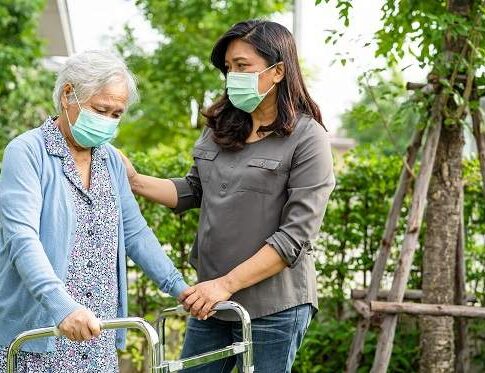When you have a loved one with mobility issues, it’s scary to leave them alone. It can seem like there are fall hazards everywhere, from the staircase and area rugs to the bathroom and bedroom. You might want them to move to an assisted living community where they can get more help. Yet, they want to remain in their home. How can you keep them safe while they’re aging in place? Here are some aids that can help both of you gain peace of mind.
Walkers & Canes
According to the National Council on Aging, an older adult dies from a fall every 19 minutes in the U.S. The good news is that a simple step, like having a cane or walker on hand, can protect your loved one from a potential injury, while giving them the independence they crave.
Both aids are the most accessible on the market today. In fact, many neighborhood drugstores sell canes. These simple tools can make a world of difference for your loved one, enabling them to walk from one place to another with more ease and comfort.
Over time, they can also help educe balance issues and lower body pain, while improving posture. Just make sure whatever cane or walker your loved one is using is set at the proper height for them for their safety and comfort.
Adjustable Beds
Adjustable beds offer another way to help your loved one when they’re aging in place. Gone are the days of traditional hospital beds. Today, there are a range of more luxurious styles and designs that can help your loved one with chronic pain, so they enjoy a more restful night’s sleep.
Most importantly, though, getting into and out of bed will be much easier with an adjustable bed. You can also add rails to the sides if you’re concerned about your loved one falling out of bed at night. In addition, an adjustable bed will make reading and watching TV more comfortable.
Motorized Stairlifts
Going up and down stairs is one the biggest hazards for seniors when aging in place. One tiny misstep can lead to a big fall and a broken bone or worse.
A stairlift can be helpful, giving your loved one the ability to navigate the staircase when they’re alone. These lifts are attached to a motorized rail that takes an individual up the staircase when they’re seated in it. They just have to be able to sit down and get up from the lift.
These can be installed on both straight and curved staircases. With today’s many options, they can even be personalized to match the style and decor of your loved one’s home, so it’s more inviting and less clinical.
Power Wheelchairs & Scooters
If your loved one has issues with mobility that are severe, including any paralysis or lower body weakness, a motorized wheelchair can help them get around. These are easier to maneuver around the home and far lighter when compared to a conventional wheelchair.
If your loved one doesn’t need a wheelchair on a regular basis, a scooter might be a better choice for helping with aging in place. These too offer greater mobility but are more heavy-duty and can be used outdoors when going for a stroll or to get around a store with more ease.
Additional Tips for Helping Your Loved One Age in Place
Before you invest in any of these mobility aids, check with your loved one’s doctor to ensure you’re making the right selections and purchasing the aids that will be most helpful. Also, call their insurance provider to find out what’s covered under their plan, so you pay less out-of-pocket for it. Oftentimes, Medicare Part B and Medicaid will cover the cost of mobility devices that are prescribed by a physician.
If your loved one is having a hard time accepting using a mobility aid, be compassionate and try to listen first. Allow them to discuss their fears and why they’re hesitant. Realize that it’s also hard for them to accept that they’re aging and require extra help. In addition, they may be fearful of continuing to lose their independence, so it’s important to be tactful and gentle.
How Home Care Can Help Your Loved One Who’s Aging in Place
Aging in place is easier and safer with the help of professionals. Consider hiring a caregiver who can assist your loved one in many ways. They can provide non-medical support, including help with mobility around the home. They can also offer transportation to and from appointments and to run errands.
Beyond providing physical assistance that helps with aging in place, a professional caregiver can offer companionship and conversation. This can be crucial if your loved one lives alone and is feeling isolated and depressed.
However, by delivering emotional and social support, combined with physical assistance, a professional caregiver can open the world back up to your loved one. They’ll be safer and happy, aging in place with as much independence as possible.
Are you interested in talking to a professional about helping a loved one with aging in place, so they can remain in familiar surroundings for as long as possible? Contact your local FirstLight® Home Care today.
